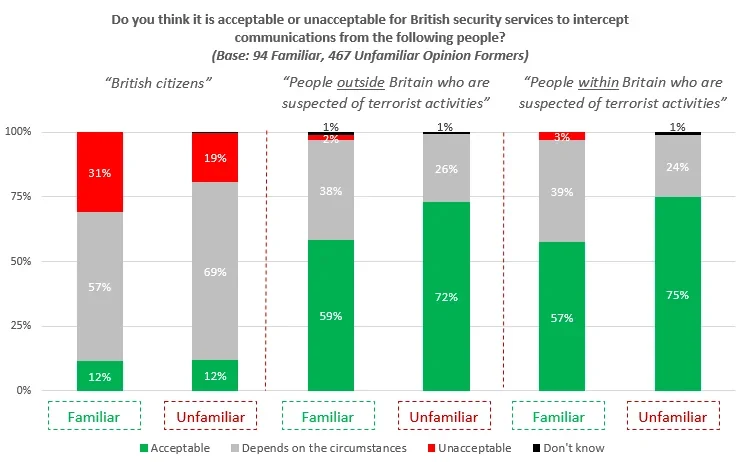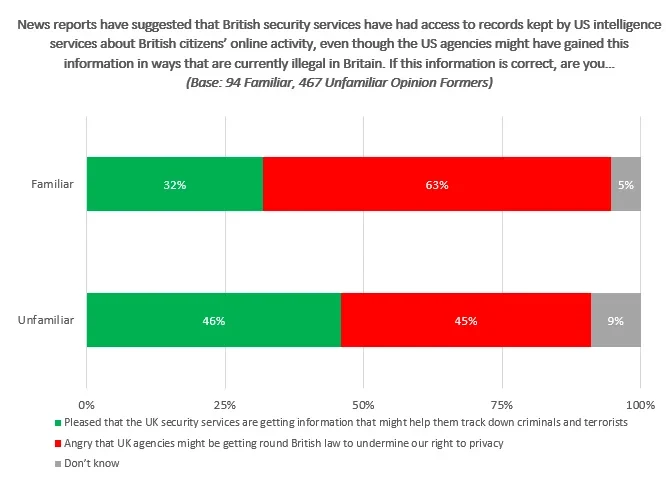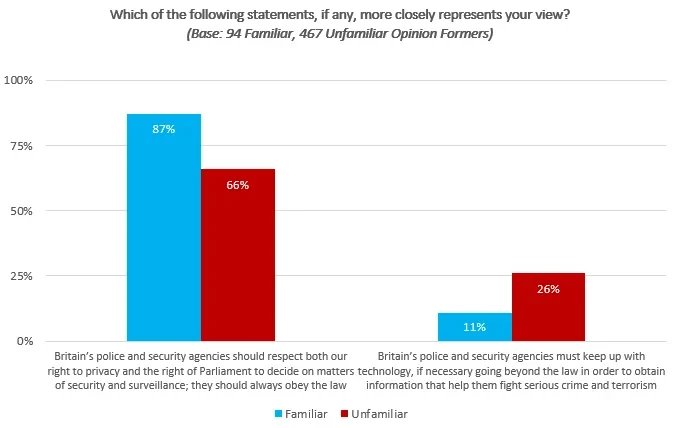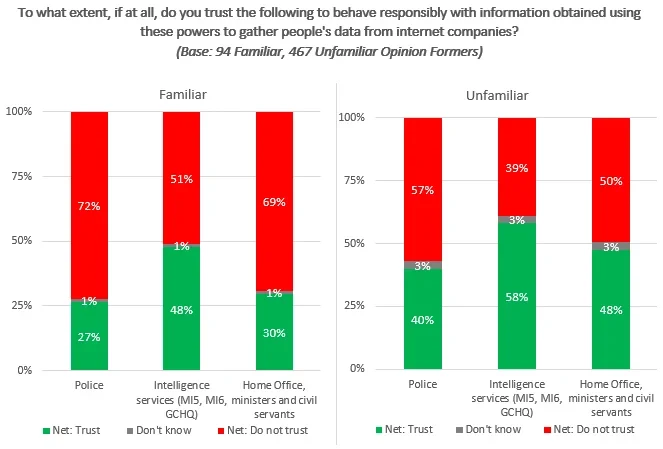...Although split over what security services should be permitted to do
When the extent of the United States’ National Security Agency’s (NSA) surveillance programme, ‘PRISM’, was revealed two years ago, outrage emanated from all quarters. Governments labelled whistle-blower Edward Snowden a traitor while free-speech activists hailed him as a patriot. The debate over government surveillance of citizens remains a polarising one, and YouGov was keen to garner the views of its UK Opinion Formers panel - which draws leaders from the worlds of business, politics, the media, charities, public sector and academia among others.
Despite Snowden’s actions in bringing this clandestine surveillance programme designed to collect people’s internet communications from internet service providers into the open, only 17% of the 561 Opinion Formers polled feel they are either very or fairly familiar with PRISM. Interestingly, the survey reveals that those familiar with PRISM hold markedly different views as to the ethics of government espial compared with those who do not consider themselves familiar.
Snowden’s leaks of PRISM activities linked Britain’s intelligence services to involvement in the programme, having access to the information gathered by the NSA upon request. This has raised concerns that Britain’s own intelligence gathering agency, GCHQ, has used the PRISM operation to circumvent British laws and eavesdrop on its own citizens illegally. YouGov asked if Opinion Formers ever thought it acceptable for British security services to intercept internet communications.
There is a stark difference in views between those familiar with PRISM and those unfamiliar on whether it is acceptable to spy on certain groups of people. Where those unfamiliar think it is acceptable to intercept the communications of ‘suspected terrorists’ either outside (72%) or inside (75%) Britain, only 59% and 57% of those familiar think the same respectively.
The familiar group also tend to express greater trepidation toward intelligence gathering on British citizens. While 12% of both those familiar and unfamiliar think it acceptable to gather data, nearly a third (31%) of the familiar group think it is unacceptable, compared to just 19% of those unfamiliar. This could highlight more concern for the potential legal precedence amongst the familiar group, where gathering data on those merely under suspicion raises all sorts of questions around one of the law’s central tenets, ‘innocent until proven guilty’.

The perceived assault on British citizens’ freedoms is more accutely felt among the familiar Opinion Formers when YouGov asked about the possibility of British intelligence services using data on British citizens gathered by the US in ways which might otherwise be illegal in the UK. Just a third (32%) of familiar Opinion Formers think the ends justify the means when it comes to the security services obtaining information to track down criminals and terrorists, compared to nearly half (46%) of those unfamiliar.

When it comes to privacy, the familiar group are more likely than the unfamiliar group to say that the police and security agencies should respect our right to privacy and always obey the law (87% compared with 66%). Conversely, 26% of the unfamiliar group think it necessary for the police and security services to go beyond the law to obtain information to fight crime and terrorism, compared to just 11% of those familiar. Interestingly however, 19% of unfamiliar Opinion Formers are both pleased that the intelligence services may have obtained information via surreptitious methods while also thinking that they should still obey the law and respect our privacy. This paradox appears to reveal a certain level of ‘doublethink’ regarding these complex issues. On the one hand, we all desire security, however the idea of abusing power is equally unpalatable to many of us.

Likewise, those familiar with state surveillance programmes express greater distrust in the authorities to behave responsibly with any personal information gathered. Only 27% trust the police while 30% trust those in the civil service. Those unfamiliar with PRISM however are more trusting of government apparatus to handle personal data responsibly; 40% have faith in the police and 48% in civil servants. However, those familiar are noticeably more trusting of the intelligence services (48%), while unfamiliar Opinion Formers trust them the most (58%).

Snowden’s revelations brought the fundamental conflict of liberty versus security to the forefront, where axioms of ‘if you have nothing to hide then you have nothing to fear’ go toe-to-toe with Lyndon B. Johnson’s conviction that “Every man should know that his conversations, his correspondence, and his personal life are private”. Perhaps though, while there is a clear need to protect the nation’s citzenry by identifying those who seek to do us harm, we should not lose sight of what it is we are trying to protect. As Snowden said in rebuttal to the former maxim, “arguing that you don’t care about the right to privacy because you have nothing to hide is no different than saying you don’t care about free speech because you have nothing to say”.
YouGov completed online interviews with 561 opinion formers from its UK Opinion Formers Panel. Opinion Formers are leaders in their field from business, media, politics, NGOs, academia and beyond. Fieldwork was undertaken between 20th and 29th May 2015. The figures have not been weighted.





